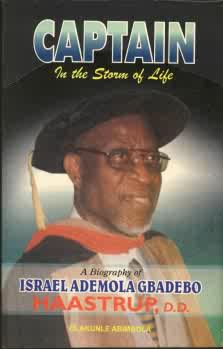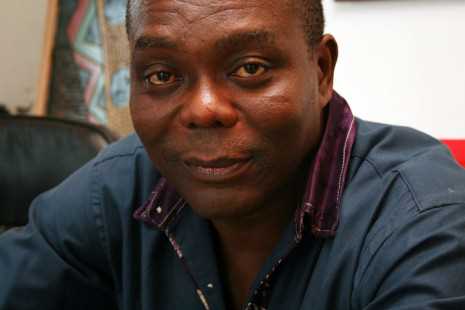Captain: In the Storm of Life; A Biography of Israel Ademola Gbadebo Haastrup, D.D., by Olakunle Abimbola; CSS Bookshops Limited and Continental Gold Network Communications Limited, Lagos; 2007; 631pp.
In this age of reading hagiographies of generals who fought no wars, politicians without vision or businessmen who struck it rich by pandering to power, it is indeed a breath of fresh air reading this book, the biography of a genuine entrepreneur written by a journalist and scholar of singular integrity. Not many Nigerians may have heard of Israel Ademola Gbadebo Haastrup, a name hardly heard in the social circuit or on the pages of the many newspapers of Nigeria. The subject of this book happens to be a man blessed with uncommon spirituality who did his work hands-on without crowing for any publicity whatsoever. For Olakunle Abimbola to have literally won over the man’s trust to as it were unburden his soul amounts to one of the great discoveries of Nigerian enterprise. The man’s name may not be on any publicity posters but his business interests in shipping, aviation, real estate, banking and hospitality spoke for him. Haastrup packed formidable financial muscle in Space World Airline; Eastern Bulkcem Company Limited, manufacturers of Eagle Cement; Omega Bank that joined other banks to form Spring Bank; Haastrup Line (West Africa) Limited involved in international shipping; Concord Hotels in Ilesa and Port Harcourt; Haastrup Jetty; Haastrup Industries; sundry real estate etc.
The well-annotated book bearing insightful pictures is divided into three broad parts, namely: Cradle, Career, Charity & Religion. In his foreword to the book, The Rev Canon Segun Agbetuyi writes, “Captain Haastrup is a man whose background and essential build-up is as transparent as an open book inviting others to read… Few years ago, he defied his doctor’s orders for complete bed rest in England and sneaked into Nigeria to attend and support a wedding in his extended family in Ilesa. The wedding successfully over, Captain Haastrup collapsed in exhaustion the same evening and was rushed, under scary conditions, to the University of Ife Teaching Hospital in Ile-Ife, where after being stabilized, he had to be evacuated abroad.” Almost in coma, Haastrup asked a frightened Reverend Agbetuyi where his faith was and promised to be back to the country hale and hearty in one month. He was back to the country in three weeks, strong as ever!
Olakunle Abimbola tells Captain Haastrup’s story in a manner that is stranger than fiction. Combining the form of the novel with the flow of the traditional story and the readability of new journalism, Captain: In the Storm of Life encapsulates a Nigerian life that spanned the course of the major events in the country’s and world history. Abimbola traces Captain Haastrup’s roots to Alatise village in his native Ilesa, a prince born into the age-old Ijesa Royal Family of Oro, one of the four ruling houses in Ilesa. His forebear Kumokun Adedeji who was sold into slavery around 1834 adopted the Haastrup name “after his Danish benefactor, who took him in as foster son from the slave ship, and gave him formal education in Freetown, Sierra Leone.” The first Haastrup would later return to rule the land as Ajimoko 1, and the other Haastrup who ruled between 1942 and 1956 retained the title as Ajimoko II. Even amid the royalty, Captain Haastrup was born into a rather modest family of a driver father and a food vendor “Iya Eleba” mother. But as the full meaning of “Alatise” translates into either “As you lay your bed, you lie on it,” or “Taking your destiny in your own hands”, Captain Haastrup made good by dint of hard-work, unstinting self-belief a faith in God.
Coming from a rich history embodying the Yoruba wars such as the famous Kiriji War, which Abimbola eloquently limns, Captain Haastrup was from the very beginning launched into the maelstrom of event and wonders. His father Lajimbiti was a “stormy master of the commuter”, reputedly the first driver in the land winning the laurel of driving the white District Officer (D.O.) He was said to have magical powers with which he disappeared from the steering wheel even while the vehicle was in motion and could fly over a fallen iroko tree! After his son had qualified as a captain steering ships all over the seas of the world, he asked his father why he did not avail him of his powers only for the old man to forget such an idea “for nothing good eventually came out of fetish powers.”
Brought up in Ado-Ekiti, Captain Haastrup who was fondly addressed as Gbadebo was a frail child who downed mangoes, the forbidden fruits, of the Oke Bareke government quarters in Ado-Ekiti. Educated at Emmanuel School, Ado-Ekiti, and Imade College, Owo, under the tutelage of Principal Michael Adekunle Ajasin, the young Gbadebo was rascally, playful and free; his talent was in mathematics. He stayed out of the boarding house in form four and fell madly in love with the young damsel Helen Aduke who would later give birth to his first son. He had a pathetic pass into form five and perforce had to return to the boarding house from where he studied and excelled such that he either took the first or the second position in class! He still made his school certificate in Division Two after surviving a near fatal accident in form six.
He came down to Lagos to the home of his wealthy uncle Baba Olowogbowo, who would later pay a steep price for supporting Nnamdi Azikiwe’s NCNC as opposed to Obafemi Awolowo’s Action Group. The young Gbadebo was a traffic clerk who doubled as a helper in the uncle’s business. He crossed over to the Nigerian Ports Authority (NPA) and then applied for cadet marine officer to man the soon-to-be-formed Nigerian National Shipping Line (NNSL) alongside two other jobs. He was successful in all three; he began training as a marine cadet in 1958.
He was a rebel cadet in the Elder Dempster Line (EDL) where he met the ill-fated boatson Patr!ck Omagbemi who would later die just as Capatain Haastrup made good with his own ship. He defied authority by choosing the School of Navigation of the University of Southampton instead of Liverpool College of Technology. He joined the Ghana’s Black Star Line in 1962 at a time Kwame Nkrumah promoted all things African. At the height of the civil war in 1968 he returned to Nigeria to work for the NNSL which he had to quit on account of intrigues.
His attempt at running a private company with two partners via Kuta Shipping Company made him lose faith in the idea of partnership in business. He was left high and dry; he borrowed N10,000 from a police officer known as Inyang and bought two trawlers that got ruined on the first day! A cement import deal crashed. He ran to England and bought the scrap, MV City of Truth, a 150-ton trawler converted into a small coaster. It took a miracle to obtain the 45 pound sterling needed for the repairs. It took 51 tempestuous days for Captain Haastrup to almost single-handedly brave the elements past the deadly Bay of Biscayne to bring the vessel back to Nigeria.
It was not until he met the Swede Jan Hjalnmarsson, who wept at Apapa Wharf while begging Captain Haastrup to be his partner that true partnership became a possibility. Sadly the Swede died young in 1983, being in the plane shot down by Russia for flying over its territory.
Captain Haastrup would in time relocate to Port Harcourt to make his wealth. His jetty built at great cost was closed by President Shagari in 1982, after only two years of business. The Concord Holiday and Health Farm Resort Limited he set up in his native Ilesa was run down by people he trusted. He ventured into bulk cement packaging in Eagle Cement. He bailed out the ailing Owena Bank into Omega Bank and finally Spring Bank. At age 70, he went farther by starting the Space World Airline.
It is in his treatment of Captain Haastrup’s deep involvement with religion that Olakunle Abimbola somewhat writes yet another book into the main book. Captain Haastrup lost interest in religion after witnessing the racism in the Anglican Church while in England. After more than a decade, he had a vision in which he was asked to pray. He ventured into the Cherubim and Seraphim sect only to run away after seeing a cheat of a priest who was even planning to kill him. Then with his “gift of dreams” he embraced the Celestial Church of Christ where the founder-prophet Pastor Samuel Bilehou Joseph Oschoffa saw him as a son. He built many churches, notably the Rebisi Group of Parishes. He would not shirk from any challenge and wrote epistles following the crisis that sundered the celestial family after the death of Oschoffa.
Captain Haastrup was a devoted family man. He married the Ghanaian Elizabeth Nana Abakah even as his childhood lover Helen Aduke gave him a first son. Nana died in 1995 shortly after returning from Ghana. Captain Haastrup would later marry Gloria Ngozi Okorie, an Igbo, through the help of his friend Eze Vincent Onyeali.
He was the author of the book Demons and Demonic Forces: A Book on the Secrets of the Life and Behaviour of Demons.
Through Captain: In the Storm of Life, Olakunle Abimbola has offered a book that is so necessary at this time that the country is in search of values. Abimbola critically analyses his subject’s business practice, to wit, the lack of necessary delegation and the absence of a succession plan. This is as complete a book as one could get, and the interviews with the subject are most times juxtaposed with the running text to assure accuracy. There are only few errors such as on page 143 where “cause” is misplaced with “course”.
This book, the second in the Modern Nigerian Leaders Series (MNLS), deserves an esteemed place in every department of entrepreneurial studies. It is consummately well-written and indexed in a manner that is rare in these shores; a splendid advertisement of a believer in Nigeria. Captain Haastrup died in 2013.



